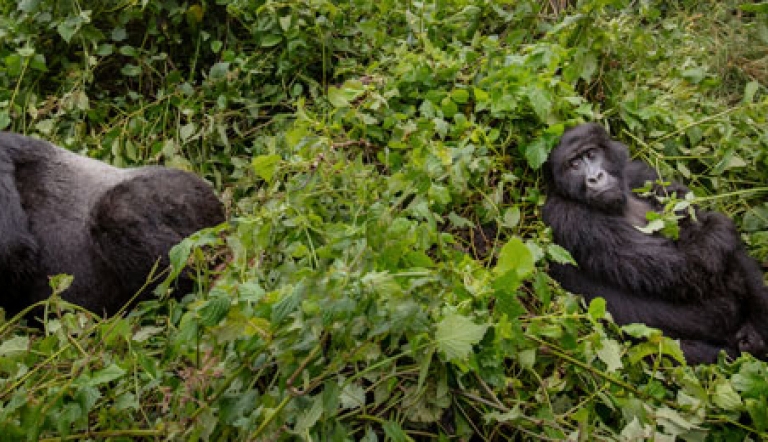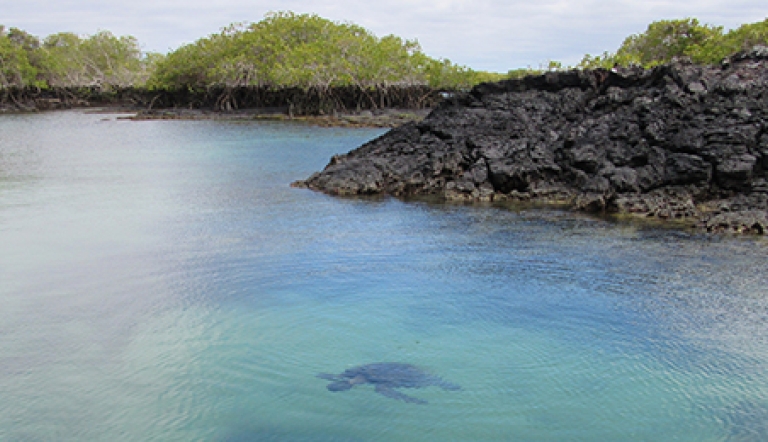Ultimate Uganda: Primate Quest and Classic Safari
About this trip
Journey through the rainforests and lush, rolling hills of Uganda in search of two of the world’s most charismatic and endangered great apes—the mountain gorilla and the eastern chimpanzee. With luck, you’ll encounter these majestic creatures and be able to observe and photograph them at close range in their natural habitat, an experience unlike any other. Also witness other iconic East African flora and fauna during hikes, safari drives, and boat rides amid the spellbinding natural landscapes of rainforests, savannas, volcanic crater lakes, wetlands, and the snow-capped Rwenzori Mountains. In addition to incredible wildlife-viewing, connect with community members and learn about their culture, traditions, and daily life.
Highlights
- Venture into the dense foliage of the Bwindi Impenetrable Forest to track and observe endangered mountain gorillas in their natural habitat.
- Trek in the rainforests of Kibale Forest National Park, home to the greatest variety and concentration of primates found anywhere in East Africa, in search of humans’ closest living relative, the chimpanzee.
- Embark on a boat ride on the Kazinga Channel in hopes of seeing hippos, African buffalos, crocodiles, elephants, and numerous water birds, including the unusual Shoebill Stork.
- Look for tree-climbing lions and other wildlife in Queen Elizabeth National Park.
- Visit a local tea plantation to learn how this important export is grown, harvested, and processed.
Activity Level 5: Strenuous
Participants should be able to ascend or descend 100 or more stairs consecutively, plus walk for at least 8 hours over some steep slopes, uneven, and potentially slippery surfaces without difficulty. Physical activities typically last for 5 or more hours at a time.
Note: The difficulty of the gorilla treks can vary depending on the animals' location at any given time, but participants should be prepared for the treks to be physically strenuous. It is not uncommon for treks to last up to six hours, and involve hiking through dense foliage and up steep, uneven, muddy or slippery slopes, often at high altitudes and in unpredictable weather. Though the guides may be able to offer some assistance, participants should be in good physical condition.
Land Cost
$9,575 - Jun 1, 2025 - Dec 30, 2026
$10,600 - Jan 5 - Dec 30, 2027
Book 10 travelers and 1 group
leader travels for free
What makes us different
Carbon offsetting
Wildlife up-close
Service anytime
Custom-tailored trips
Marketing support and resources
Support local communities
Daily Itinerary
Print ItineraryDepart US
Day 1Entebbe
Day 2Bwindi National Park
Day 3Bwindi National Park
Day 4Bwindi National Park
Day 5Queen Elizabeth National Park
Day 6Queen Elizabeth National Park
Day 7Queen Elizabeth National Park
Day 8Kibale
Day 9Kibale
Day 10Entebbe
Day 11Day 12
Pricing
Print PricingLand Cost
$9,575 - Jun 1, 2025 - Dec 30, 2026
$10,600 - Jan 5 - Dec 30, 2027
Book 10 travelers and 1 group
leader travels for free
What's Included
- Arrival and departure transfers based on individual flight schedules
- English-speaking guide, private transportation, and entrance fees.
- Accommodations with private bathrooms
- Activities and meals as mentioned in itinerary
- Internal flights relevant to itinerary
- Water refill station during transfers
- Non alcoholic beverage with meals
- Carbon Offset
What's Not Included
- International flights
- Items of personal nature
- Tips
- Travel Insurance
Pricing Details
Prices are valid for travel from Jun 1, 2025 - Dec 30, 2026. Holiday surcharges may apply.
Travel Info
Print Travel InfoEntry & Exit Requirements
U.S. citizens must have a valid passport to enter Uganda. Passports must be valid for at least six months beyond the date of entry and have at least one fully blank page available for the entry/visa stamps.
A tourist visa is also required for entry. You will not be able to apply for the visa at the airport upon arrival; travelers must apply for a visa online at least two weeks prior to travel by completing the e-visa application form and making payment online at https://visas.immigration.go.ug. (The earliest you can apply is 3 months prior to arrival.)
To apply, you will need your passport, a recent passport-size photo, proof of return ticket, and a yellow fever certificate (see below for more information). The fee for a single-entry tourist visa is USD $50 plus a 3% online processing charge (subject to change), payable by Visa or MasterCard.
Please be aware that the online system will ask you to input your requested duration of stay. The count begins not from your date of entry, but from the date of visa approval. For this reason, we recommend applying for a 3-month visa, the maximum allowed, as this gives you 90 days from the date of visa approval to enter the country. (Please verify that this timeframe corresponds with your travel plans. If you do not enter the country within the specified number of days, you will forfeit your visa and any fees paid and must apply again.)
Once payment is made, the system will process your application and send you a barcoded email indicating that you are eligible for the approved visa. Print out this email and bring it with you to Uganda. Upon arrival you should present your passport, yellow fever certificate, and the barcoded email to the immigration officer, who will scan the barcode and take your fingerprints and photo. Final approval of the visa is issued upon arrival at the airport in Uganda.
If you are not traveling with a U.S. passport, please check with the Ugandan Embassy for the requirements based on your nationality.
Health Information
IMMUNIZATIONS
The Centers for Disease Control recommends that all travelers be up to date on routine vaccinations such as measles-mumps-rubella (MMR) vaccine, diphtheria-pertussis-tetanus vaccine, varicella (chicken pox) vaccine, and your yearly flu shot before every trip.
Proof of vaccination against yellow fever is required for all travelers (age 1 year or older) entering Uganda. Please note: Yellow fever vaccine availability is currently limited in the US. To receive the vaccine, you may need to travel some distance and schedule your appointment well in advance. You will need to show your yellow fever certificate to apply for your visa, and your visa application must be submitted at least two weeks before departure; for this reason, we strongly recommend making arrangements for your yellow fever vaccine well in advance of your departure.
Though not required, the CDC recommends hepatitis A, hepatitis B, and typhoid vaccines for most unvaccinated travelers visiting Uganda. The CDC also recommends the polio vaccine for unvaccinated travelers, or a single lifetime booster dose of Inactivated Polio Vaccine (IPV) for adults who previously completed the full, routine polio vaccine series as children.
Additional vaccines may be recommended for some travelers. Please consult your physician for additional information and recommendations based on your individual circumstances.
MALARIA
The CDC warns that travelers to Uganda may be at risk for exposure to malaria. Malaria is caused by a parasite found in Anopheles mosquitos, which are active from dusk until dawn. Prevention is twofold: the use of anti-malarial drugs and the prevention of mosquito bites. If you choose to use an anti-malarial drug, as recommended by the CDC, see your physician for a prescription.
To protect against mosquitos, the CDC recommends that you cover exposed skin with lightweight, long-sleeved shirts and pants, consider treating clothes with permethrin, and use an insect repellent containing an EPA-registered active ingredient like DEET, picaridin, or oil of lemon eucalyptus (OLE). Apply sunscreen first, followed by the repellent, ideally 20 minutes later.
Be careful when applying products containing DEET, as it can damage or dissolve certain synthetic fabrics as well as plastic, rubber, vinyl, or elastic materials, such as those used in camera equipment, binoculars, phone cases, sunglasses, or watches. Additionally, some research suggests that when DEET and picaridin enter local waterways, they can be harmful to amphibians and other wildlife. When selecting a repellent, it is ultimately up to each traveler to weigh the risks and benefits of different options, keeping in mind both environmental factors and the importance of protecting against illness.
OTHER VECTOR-BORNE ILLNESSES
Other vector-borne illnesses are known to occur in Uganda, including dengue fever, Zika virus, African tick-bite fever, and others. Travelers should protect themselves against insect and tick bites using the measures described above.
After spending time outdoors in grassy or wooded areas, the CDC recommends showering and conducting a full-body check for ticks. If you find a tick attached to your skin, safely remove it as soon as possible.
As a precaution, the CDC advises women who are pregnant to consider postponing travel to any area where Zika virus transmission is ongoing.
WILDLIFE
Follow all instructions from your guides regarding wildlife. Animals may become aggressive to protect themselves, their young or their mates, or to guard a food supply. Do not make sudden movements either toward or away from them, as this may be interpreted as threatening or territorial. Avoid stray dogs, as they may carry rabies. In the unlikely event of being bitten or scratched by a dog or other mammal, clean the wound and control bleeding. Seek medical attention immediately.
SUN EXPOSURE
The effects of the sun can be damaging to the eyes and skin. Spending time outdoors exposes you to the sun’s harmful ultraviolet (UV) rays, even on cloudy days. To protect yourself from the sun, use a broad spectrum sunscreen of at least SPF 15, protect skin with clothing, wear a wide-brimmed hat and sunglasses, and drink plenty of fluids.
Respiratory Illness Protocols
Please review our Respiratory Illness Protocols page, which explains our policy and procedures if you or another traveler should develop symptoms of a respiratory illness during your trip. Your participation in a Holbrook Travel program indicates that you are in agreement with these protocols.
Resources
Print ResourcesSuggested Packing List
Everyone has personal preferences when it comes to packing; for this reason, the information below is offered as a general guide and not a definitive list. You know yourself best: Use your discretion and pack what you think will serve you, based on your personal preferences and specific itinerary.
You may find many of the items below in the New Headings Gear Store. Use code HolbrookGuest10 for a 10% discount on your purchase.
CLOTHING
Bring enough clothing suitable for the length of your program. If you prefer to pack light, note that many hotels offer laundry services at additional cost. If you plan to hand-wash items, remember that humidity may delay drying time.
Pack clothing that can be worn in layers to adapt to weather changes throughout the day. Clothing that wicks away moisture and dries quickly is recommended. Casual, safari-style clothing is suitable for most activities. Uganda's rainy season is September to November and March to May.
Bring clothes in neutral or muted colors such as green, khaki, brown, or gray. We recommend that you avoid wearing bright colors or white as they can easily be spotted by animals. In addition, blue is particularly attractive to certain insects and should be avoided. It is illegal for civilians to wear army-style camouflage clothing in Uganda.
- A combination of short-sleeved and lightweight, long-sleeved shirts for sun and insect protection
- Shorts or skirts (knee-length or longer)
- Lightweight, quick-drying long pants for sun and insect protection
- Undergarments
- Sleepwear
- Jacket or sweater/sweatshirt
- Bathing suit(s)
- Socks – Bring extra pairs.
- Shoes – You’ll likely want at least one pair of comfortable, closed-toe walking or hiking shoes or boots with good ankle support, suitable for forest hikes and walking over cobblestones or other uneven terrain. Sturdy hiking boots are recommended for gorilla forest hikes. In addition, many participants opt for a pair of sturdy sport-strap sandals (e.g. Keens, Tevas, or similar) and/or casual flip-flops or sandals for around your accommodations.
- Lightweight rain jacket, hooded poncho, and/or windbreaker
- Visor or wide-brimmed sun hat with ties
- Bandana, scarf, or neck gaiter
- Leather, gardening-type gloves (for gorilla treks)
Personal Toiletries
Pack toiletries based on your personal preferences and habits. Below are just a few recommendations to keep in mind.
- Shampoo, conditioner, lotion, deodorant/antiperspirant, etc. – If possible, avoid strong fragrances.
- Soap and washcloth or a small, quick-drying microfiber towel – Washcloths are not standard in all hotels. If you normally use a washcloth, you may wish to bring one from home.
- Hairbrush, comb, hair ties, shower cap
- Toothbrush and toothpaste
- Razor
- Ear plugs, especially if you are a light sleeper
- Personal hygiene products
- Insect repellent (see note below about treating clothing with permethrin)
- Sunscreen and lip balm with SPF
- A travel pack of tissues – also useful as napkins or toilet paper if needed
In addition to your personal toiletries, it is useful to pack a small medical kit, which you can easily prepare. Helpful items might include: bandages, antihistamine, a pain reliever, motion sickness and/or altitude sickness medication (if you are prone to either), anti-diarrhea medicine, powdered electrolyte packets to prevent dehydration, aloe vera gel for sunburn, individually wrapped pre-moistened towelettes and/or hand sanitizer, antibiotic ointment, anti-fungal cream, moleskin for blisters, eye drops, tweezers, a mini sewing kit, and an extra pair of disposable contact lenses or eyeglasses if you wear them.
Days before you leave home, you may wish to consider spraying any clothing, socks, and shoes that will be worn in lowland, tropical sites with permethrin, an anti-parasite medication, to repel irritating pests and prevent the spread of disease. A recommended brand is Sawyer. Carefully read all instructions before use. Please note permethrin is highly toxic to cats and fish, and some aerosol products may be harmful to birds. Side effects may include minor itching, burning, or redness. You may want to use a laundry marker to label and keep track of which socks are permethrinized. Only one application per item is necessary; permethrin on treated clothes remains effective through several washings. Permethrin should NOT be applied directly to skin.
Miscellaneous
Remember to pack valuables such as your passport, cash/credit cards, and medications in your carry-on luggage.
- Passport, visa letter, and photocopies of all travel documentation
- Yellow fever certificate
- Personal insurance card and travel insurance information
- Money – ATM/credit card and/or cash; small bills in good condition are recommended
- Prescription medicines (if applicable), with a copy of the prescription
- Sunglasses with strap
- Small day pack for hikes and excursions
- Flashlight and/or head lamp
- Travel alarm clock or inexpensive waterproof wristwatch with alarm – Not all hotels provide alarm clocks.
- A pocket calculator or phone to assist with conversions and currency exchange
- Binoculars with lens cleaner
- Camera and related equipment, such as charger, lenses, and extra memory cards
- Reusable water bottle
- Non-perishable snacks
- Pocket-knife or multipurpose tool – Pack in your checked luggage.
- Reusable zip-top style bags – useful for packing toiletries, sorting clothing, storing damp or muddy shoes, or as a dry bag for protecting electronics
- Notepad or travel journal and pen
- Music or reading material for down time, long bus drives, or on the airplane, and a portable bright light to read by
- Hiking poles or collapsible walking stick with rubber tip – Pack in your checked luggage.
- A small quantity of laundry detergent if you’ll be washing clothing by hand
- Money belt
- Voltage converter, plug adapter, and chargers for electronics
- Dry bag for electronics
Plastic bags
Due to Uganda's ban on plastic bags, travelers are not permitted to bring plastic bags into the country. This includes garbage bags and grocery/shopping bags. Zip-top style bags specifically used to carry toiletries per TSA’s liquids rule are still permitted on the assumption that they will be reused on the return flight. Items purchased at the airport before boarding the aircraft should be removed from plastic bags. Please double-check your carry-on luggage before disembarking in Uganda; any plastic bags should be left on the plane to avoid delays and possibly fines.
LUGGAGE WEIGHT RESTRICTIONS
Pack lightly. Charter flights have a baggage weight limit of a maximum of 30 lbs. If your bags are heavier, it is likely you will be required to pay an excess luggage fee. For this reason, soft bags are preferable to hard suitcases.

Questions
For more information, contact us at 800-451-7111 or email travel@holbrooktravel.com.
















